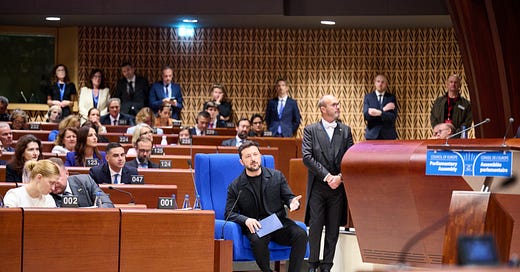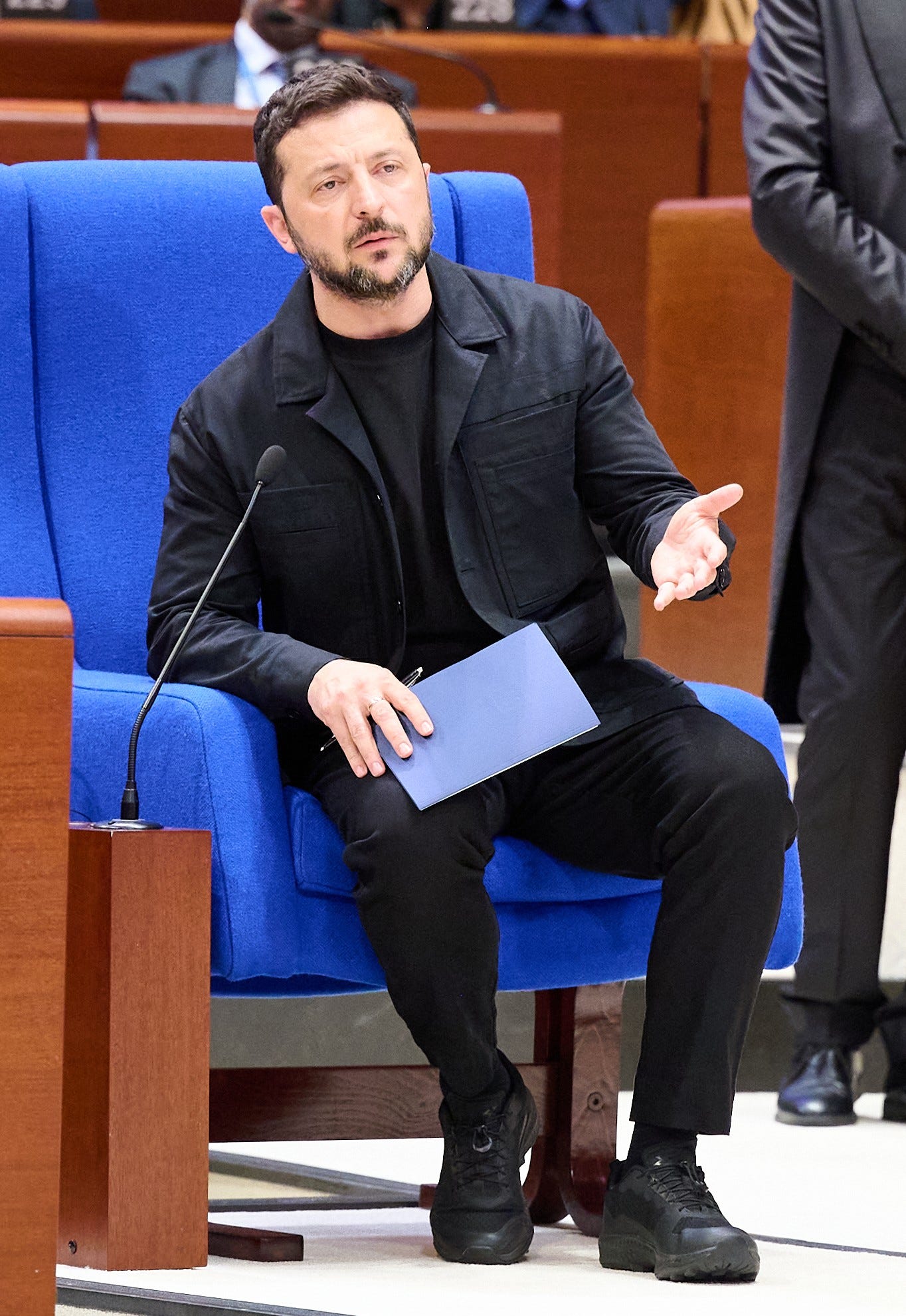Council of Europe War Tribunal for Putin
Zelensky and the Council of Europe President have signed an agreement to establish a tribunal for prosecution of crimes in and leading to the war in Ukraine, including prosecution of Putin
Putin will go before a Tribunal of War at the Council of Europe
Yesterday in Strasbourg at the Parliamentary Assembly (PACE) of the Council of Europe, Ukraine and the Council of Europe signed an agreement to establish a Special Tribunal for the Crime of Aggression against Ukraine.
In his speech to the Assembly, Zelensky hailed Europe’s commitment to justice after signing the agreement of establishing the war tribunal. He thanked PACE for real leadership in its stand against Russian aggression and commitment to justice for all.
It was here in this Assembly, that the first call for such a tribunal was made. The idea was born here – and now it’s gaining real support from partner countries in Europe and beyond.
It will take strong political and legal co-operation to make sure every Russian war criminal faces justice—including Putin. This is the path we must walk—all the way to real charges and real verdicts.
The new Tribunal, signed into existence by Council of Europe Secretary General Alain Berset and President Zelensky on behalf of the Ukrainian government, will have a mandate to prosecute senior leaders for the crime of aggression - the decision to use armed force against another state - in violation of the UN Charter.
Senior legal experts from a dedicated Core Group of around 40 states have been working together with the Ukrainian authorities, the Council of Europe and the EU to draft the three legal instruments needed to establish the Tribunal.
The aggressor must lose. We’re working on that. But justice matters too. It must work – so that war criminals have nowhere to hide, not in Europe, not anywhere. And in a way that sets a legal principle – NO rewards for aggression, Zelensky said, in conclusion.
This is the first time a dedicated international tribunal is being created to address the crime of aggression. Zelensky referenced tribunals (in Nuremberg) held to try Nazis after WWII and the one in The Hague which tried individuals accused of war crimes during the wars in the former Yugoslavia, arguing that they should be a basis for how Russian officials need to be held to account.
Existing international courts, including the International Criminal Court in The Hague, lack jurisdiction to prosecute Russian nationals for that specific offence.
Zelensky expressed optimism that the tribunal is a real chance to finally restore some justice to the people of Ukraine who have suffered unspeakable crimes at the hands of Russian forces. He accused Putin of being a war criminal and urged for him to be tried. ‘Other institutions, even international ones, don't have the tools to do this. And we need to show clearly aggression leads to punishment.’
Zelensky answering questions at the Council of Europe in Strasbourg 25 June 2025 Photo:Alban Hefti © Council of Europe
Regarding further questions on statutory and practical matters, see below in this text, including link to FAQ.
Understanding the Council of Europe
The Council of Europe at a glance: 46 member states with total 700 million citizens. Mission: To promote democracy, human rights and the rule of law across Europe and beyond.
Founded in 1949, it is Europe's oldest intergovernmental organization and has no legislative function, although it has successfully created treaties such as the European Human Rights Convention and is the base for the European Human Rights Commissioner and the European Court of Human Rights.
Not to be confused with the European Union (EU) which is a separate union of 27 European states that are, however, all members of the Council of Europe. The confusion is unfortunately enhanced by the fact that EU’s flag is identical to that of the Council of Europe, the circle of golden stars on a blue background. It is also confusing that EU itself also has the European Council as top decision making forum, consisting of the heads of state and government of the member countries.
Member countries of the Council of Europe are basically all European countries, with a few exceptions. Russia was a member from 1996 to 2022, when it was expelled after having been suspended since its invasion of Ukraine. Nearly all other countries with territory in Europe are members, with the exception of Belarus, Kazakhstan, and Vatican City, as well as states with limited recognition.
Understanding the Special Tribunal
From the FAQ on the Special Tribunal
1. What is the Special Tribunal for the Crime of Aggression against Ukraine?
The Special Tribunal will be set up within the framework of the Council of Europe with the mandate to prosecute senior political and military leaders for the crime of aggression against Ukraine. This crime refers to the decision to use armed force against another state, in violation of the UN Charter.
2. Why is a new tribunal necessary? Is the International Criminal Court (ICC) not already handling this?
The ICC has the jurisdiction to investigate war crimes, crimes against humanity, and genocide in Ukraine. However, it cannot currently examine the crime of aggression in this case due to jurisdictional limitations for the crime of aggression. The Special Tribunal will fill this gap.
3. Is there a plan/agreement setting out how the Special Tribunal will interact with the ICC (for example if they are dealing with the same suspects)?
According to its Statute, the Special Tribunal is complementary to the ICC, and the Special Tribunal and the ICC are expected to conclude agreements on mutual cooperation. When a person concerned is detained by the ICC, that will have primacy over proceedings before the Special Tribunal.
4. What exactly is the crime of aggression?
The crime of aggression is when a state’s leaders launch or plan a war. It is considered a “leadership crime,” meaning it concerns those in positions of power who made or facilitated the decision to go to war.
5. Who will be held accountable by this tribunal? Is the Russian Federation not already being held accountable in other ways?
The tribunal will focus on senior political and military leaders who are responsible for planning, preparing, initiating, or executing the crime of aggression against Ukraine.
The Russian Federation is also being held accountable in other ways — through sanctions, political condemnation, and ongoing legal proceedings before the European Court of Human Rights and other international courts.
However, holding individuals criminally accountable for the decision to wage a war of aggression is a separate and crucial step toward justice and deterrence.
As pointed out above, although the ICC can prosecute individuals responsible for war crimes and crimes against humanity committed in the course of the war, it will not be possible to bring the waging of the war as such before the ICC in this case.
The institution will be funded by supporting countries known as the Core Group, which consists of 40 states. The United States backed the project under former President Joe Biden, but President Donald Trump’s administration did not support the initiative.
At the same time, Ukraine and the EU have agreed to strengthen the evidence gathering effort already in place. The International Centre for the Prosecution of the Crime of Aggression against Ukraine (ICPA) operates in the Hague, hosted by the European Union Agency for Criminal Justice Cooperation (Eurojust). The Centre is key to investigate Russia's crime of aggression against Ukraine and facilitate case building for future trials. The Centre, set up with the Commission's support, is composed of selected national prosecutors that are already participating in the Joint Investigation Team, to which the Centre is linked in its operations.





